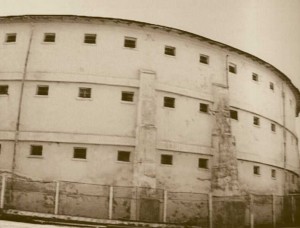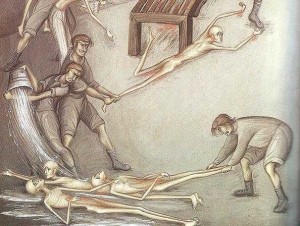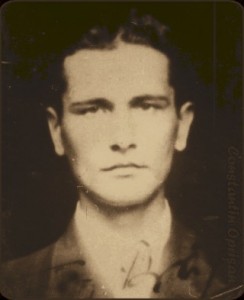Poetry in Translation (CCCLXIV), Constantin OPRIŞAN (1921,co. BACĂU – 1959, JILAVA Political Prison, BUCHAREST, ROMANIA): “Vesperală”, “Vespers”
Vesperală
Constantin_Oprişan
(1921, Co. Bacău, Romania – 1959, Jilava political prison, Bucharest, Romania)
Cânta singuraticul flaut,
Pe vânt alerga elegia.
Cu vântul, cu cântul te caut,
Maria, Maria, Maria!
Şi frunza cânta în dumbravă,
Şi-n freamăt pierea armonia.
Şi inima-mi cântă, bolnavă,
Maria, Maria, Maria!
Şi vântul, şi cântul, şi inima-mi frântă,
Şi toamna, şi frunza-şi trăiau agonia.
Tăcere… Un flaut mai cântă:
Maria, Maria, Maria!
* * * * * * *
VESPERS
Constantin_Oprişan
A lonely flute is singing,
The elegy’s blown off the road.
And yet, it is you I am seeking,
Oh, Mary – the Mother of God!
As tree leaves are carried asunder,
They lose the colour they’ve got.
My singing heart does flounder,
Oh, Mary – the Mother of God!
The battered Soul is breaking,
Like tree leaves on Golgotha’s road.
As a prayer, a lone flute is singing,
Oh, Mary – the Mother of God!
Rendered in English by Constantin ROMAN, London,
© 2015 Copyright Constantin ROMAN
As an active opponent of the Communist regime imposed by the Soviet occupation of Romania, at the closure of WWII, Costache Oprișan is arrested in 1951 and condemned to twenty five years of hard labour. He is first an inmate of the infamous Pitesti prison, where he undergoes a so-called regime of ”re-education”, with the result of enduring the worst punishment ever perpetrated by the infamous torturer, Ion Turcanu. As this was not enough, Oprișan is transferred to another prison, of savage reputation, Gherla, where he contracts tuberculosis and is confined to the Văcărești prison hospital. In 1958 he is transferred to the extermination unit of Casinca, at Jilava prison, near Bucharest, where he spends his last days in a windowless, damp cell, with water pouring down the walls. His cellmates learned by heart his poems, which he recited from memory, as they were never written, in conditions where pen and paper were unheard of.
Costache Oprișan died in June 1959, aged 37, less than a year after arriving at Jilava, his body thrown into an unmarked, communal grave.
Oprisan’s poems, which were part of an oral mythology, were finally collated and published in 2009, forty years after his death, and twenty years after the demise of Ceauşescu’s Communist dictatorship.






Noul Martir Constantin Oprişan – Un mărturisitor plămădit din credinţă și rugăciune. Omagiul din Ziarul Lumina la aniversarea zilei de naştere – 16 Martie 1921 – MĂRTURISITORII // Mar 16, 2017 at 1:40 pm
[…] Rendered in English by Constantin ROMAN, London, © 2015 Copyright Constantin ROMAN / Poetry in Translation / Romanian Studies […]